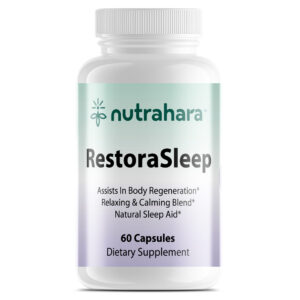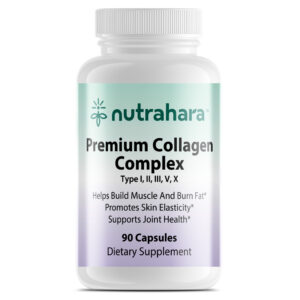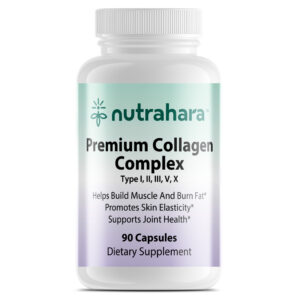
Is the glow of your alarm clock a familiar, unwelcome companion in the middle of the night? If you’re tired of tossing and turning, only to face the day feeling irritable and drained, you are not alone on this journey. The search for a solution can be overwhelming, especially when you’re wary of prescription aids or have been let down by supplements that leave you feeling groggy. Finding the right natural sleep supplement shouldn’t be another source of stress; it should be a gentle step toward reclaiming your vitality and well-being.
This is your complete guide to navigating the world of natural sleep support with confidence. Drawing from a blend of ancient botanical wisdom and modern clinical research, we’ll uncover the science-backed ingredients that can help you quiet your mind, sleep through the night, and wake up feeling genuinely refreshed and clear-headed. It’s time to find a gentle, effective, and sustainable solution for the restorative rest you deserve, transforming your wellness journey for 2026 and beyond.
Key Takeaways
- Understand the crucial difference between natural sleep support and other aids, and how quality rest specifically impacts women’s hormonal health and stress levels.
- Explore the most effective, science-backed ingredients found in a natural sleep supplement and learn the specific role each plays in calming your mind and body.
- Pinpoint your unique sleep challenges-whether it’s falling asleep or staying asleep-and discover how to choose the right ingredients for your personal needs.
- Learn simple lifestyle habits and evening rituals that work in harmony with your supplements to create the ideal conditions for deep, restorative rest.
Beyond Counting Sheep: Why Natural Sleep Support Matters for Women
For many women on their wellness journey, a truly restful night can feel elusive. A natural sleep supplement offers a holistic path forward, differing fundamentally from synthetic over-the-counter (OTC) or prescription aids. Rather than inducing an unnatural state of sedation, these supplements are formulated with clinically-studied botanicals and natural compounds to support and enhance your body’s own innate sleep processes. This distinction is vital, especially for women, as poor sleep can significantly disrupt hormonal balance, amplify stress responses, and destabilize mood.
Achieving quality sleep is about more than just logging hours; it means cycling smoothly through all four stages of sleep to allow for physical repair and mental restoration. The ultimate goal is to wake feeling revitalized and clear-headed, a state that can be difficult to achieve with conventional options. The journey to better rest begins by working in harmony with your body, not against it.
The Problem with Traditional Sleep Aids
Many common OTC sleep aids contain antihistamines like diphenhydramine, which can lead to a dreaded “hangover effect” of next-day grogginess and mental fog. Prescription medications, while effective for some, can carry a risk of dependency. A natural approach, grounded in both ancient wisdom and modern research, seeks to avoid these pitfalls by gently encouraging your body’s own sleep mechanisms, supporting long-term, restorative rest without creating reliance.
Understanding Your Body’s Natural Sleep Signals
Your body has a sophisticated internal clock, orchestrated by key hormones. Melatonin, the “hormone of darkness,” signals your brain that it’s time to rest, while cortisol, the “stress hormone,” should naturally decline in the evening. Modern life-with its chronic stress and constant exposure to blue light from screens-disrupts this delicate rhythm. Understanding melatonin’s role in the sleep-wake cycle is foundational to reclaiming your nights. A thoughtful natural sleep supplement works to help restore this essential balance, paving the way for serenity.
The Science of Serenity: Key Ingredients in Natural Sleep Supplements
Understanding what’s inside your natural sleep supplement is the first step on your journey to better rest. The effectiveness of these formulas isn’t magic; it’s rooted in science. Each ingredient is chosen for a specific, synergistic role in preparing your body and mind for deep, restorative sleep. In fact, a growing body of scientific evidence for natural sleep supplements supports the mechanisms behind these powerful botanicals and minerals. Let’s explore the key players.
- Melatonin: The body’s natural sleep-triggering hormone.
- Magnesium: A vital mineral for muscle and nervous system relaxation.
- L-Theanine: An amino acid that promotes calm without drowsiness.
- Ashwagandha: An adaptogenic herb that lowers stress and quiets a racing mind.
Hormone Regulators & Cycle Supporters
These ingredients work in harmony with your body’s internal clock. Melatonin is the star player, signaling to your brain that it’s time to sleep. While effective, less is often more; a low dose (0.5-3mg) is typically sufficient. It’s ideal for those with disrupted sleep-wake cycles, like shift workers. Supporting players include Valerian Root, which research suggests can improve sleep quality, and Tart Cherry, a natural source of melatonin.
Mind & Body Calming Agents
When physical tension or a busy mind keeps you awake, these calming agents can help. Magnesium Glycinate is a highly bioavailable form of the mineral, meaning your body can absorb and use it efficiently to relax muscles and calm the nervous system. L-Theanine, an amino acid found in green tea, helps reduce the time it takes to fall asleep by promoting alpha brain waves associated with a state of “wakeful relaxation.” Gentle herbs like Chamomile and Lemon Balm also belong in this category, known for their soothing properties.
Stress & Cortisol Adaptogens
For many, the primary obstacle to sleep is stress. Adaptogens are unique herbs that help your body adapt to and manage the effects of stress. Ashwagandha is a cornerstone of Ayurvedic tradition, clinically studied for its ability to lower levels of the stress hormone cortisol. By calming your body’s stress response, it helps prevent the late-night “wired and tired” feeling, making it easier to unwind. For those whose sleep is disrupted by anxiety, incorporating a high-purity formula like Nutrahara’s Ashwagandha with Black Pepper can be a vital part of a holistic sleep solution.
Your Personal Sleep Solution: Matching Ingredients to Your Needs
One of the most common questions we hear is, “Will this actually work for me?” The answer lies in understanding that not all sleep challenges are the same. Your wellness journey is unique, and your path to restful nights should be too. The most effective natural sleep supplement is one formulated to address your specific needs. Think of this guide as your personal roadmap, designed to help you select ingredients with intention. These natural allies work best as part of a holistic approach, especially when combined with healthy sleep hygiene practices that create a sanctuary for rest.
Challenge: Trouble Falling Asleep (Racing Mind)
If your mind starts running a marathon the moment your head hits the pillow, your goal is to promote a state of calm. You need ingredients that gently soothe the nervous system and quiet mental chatter. These botanicals and minerals signal to your body and mind that it’s time to wind down.
- L-Theanine: An amino acid found in green tea that encourages a state of relaxed alertness without drowsiness.
- Ashwagandha: A revered Ayurvedic adaptogen that helps regulate stress by lowering cortisol levels.
- Magnesium: An essential mineral that helps calm the nervous system by regulating key neurotransmitters.
- Lemon Balm: A traditional herb known for its ability to reduce anxiety and promote tranquility.
Challenge: Waking Up in the Middle of the Night
For those who fall asleep easily but struggle to stay asleep, the focus shifts to supporting deeper, more sustained rest. The right ingredients can help you navigate through the natural sleep cycles without disruptive awakenings, ensuring you remain in a restorative state until morning.
- Valerian Root: Clinically studied for its ability to improve sleep duration and reduce nighttime awakenings.
- Melatonin (low dose): Supports the body’s natural sleep-wake cycle, helping to maintain sleep throughout the night.
- Glycine: An amino acid shown in research to help lower core body temperature, a key physiological signal for staying asleep.
Challenge: Waking Up Feeling Groggy & Unrested
Quality over quantity is key. If you log a full eight hours but still feel exhausted, you may need to improve your sleep architecture-the very structure of your nightly rest. The goal here is to find a non-sedating natural sleep supplement that enhances deep and REM sleep, so you wake up feeling genuinely refreshed.
- Magnesium: Essential for deep, restorative sleep, a deficiency can lead to lighter, more restless nights.
- Apigenin (from Chamomile): This powerful bioflavonoid promotes relaxation and improves sleep quality without causing morning grogginess.
- Tart Cherry: A natural source of melatonin and antioxidants that research suggests can improve overall sleep efficiency.
Creating Your Sanctuary: Lifestyle Habits to Amplify Your Supplement’s Effects
Embarking on your wellness journey with a natural sleep supplement is a powerful step toward reclaiming your nights. However, to truly unlock its full potential, it’s essential to view it as part of a holistic, nurturing routine. Think of your supplement as the key and your lifestyle habits as the door-together, they open the way to profound, restorative rest. By creating a conscious nighttime ritual, you signal to your body and mind that it’s time to transition from the demands of the day to a state of deep tranquility.
Your Pre-Sleep Power-Down Routine
Crafting a consistent “power-down” sequence is one of the most effective ways to prepare for sleep. This simple, three-step ritual helps regulate your internal clock and enhances the calming effects of your chosen supplement.
- Step 1: Dim & Disconnect. About 60-90 minutes before bed, dim the lights in your home. Crucially, step away from all screens-phones, tablets, and televisions. The blue light emitted from these devices can suppress melatonin production, your body’s natural sleep hormone.
- Step 2: Unwind Mindfully. Dedicate 20-30 minutes to a calming activity. This could be reading a physical book, practicing gentle stretching, listening to serene music, or meditating. The goal is to quiet your mind and release the day’s tension.
- Step 3: Take Your Supplement. Approximately 30-60 minutes before you intend to be asleep, take your natural sleep supplement. This timing allows the clinically-studied, natural ingredients to begin their work, gently guiding you toward slumber as you finish your routine.
Optimizing Your Environment for Deep Sleep
Your bedroom should be a sanctuary dedicated to rest. A few simple adjustments to your environment can dramatically improve sleep quality and help you stay asleep through the night.
First, focus on the three pillars of a sleep-friendly environment: keep it cool, dark, and quiet. A cooler room temperature (around 65°F or 18°C) is scientifically proven to promote better sleep. Invest in blackout curtains to block out all light, and consider a white noise machine or earplugs to mask disruptive sounds. Finally, be mindful of what you consume in the hours before bed. Avoid caffeine after 2 PM and steer clear of large meals or alcohol close to bedtime, as these can interfere with your natural sleep architecture. Embracing this balanced lifestyle is at the heart of the Nutrahara philosophy.
The Nutrahara Approach: Blending Ancient Wisdom with Modern Science
Your wellness journey is personal, and finding the right support for restful sleep is a crucial part of it. At Nutrahara, our philosophy is rooted in combining the time-tested principles of ancient Ayurveda with the precision of modern clinical research. We believe the most profound solutions are found where nature’s intelligence meets scientific validation. This approach allows us to create a truly effective natural sleep supplement that honors your body’s innate rhythms.
We don’t just select powerful ingredients; we formulate them to work in harmony. This synergy is the key to unlocking consistent, restorative sleep and promoting a balanced lifestyle.
Introducing RestoraSleep: Formulated for Complete Renewal
RestoraSleep is the culmination of our philosophy-a comprehensive solution designed for the modern woman facing common sleep challenges. Our clean and simple formula addresses both falling asleep and staying asleep, helping you wake up feeling renewed. Each ingredient is clinically studied and chosen for its specific role:
- Melatonin: A gentle dose to signal to your body that it’s time for rest, helping to regulate your natural sleep-wake cycle without causing grogginess.
- Magnesium Glycinate: A highly absorbable form of magnesium that calms the nervous system, relaxes muscles, and supports deeper, more continuous sleep.
- L-Theanine: An amino acid found in green tea that quiets an anxious mind, easing the transition into a peaceful slumber.

Your Journey to Better Sleep Starts Tonight
Choosing the right natural sleep supplement is an investment in your total well-being. Our unwavering commitment to purity, quality, and efficacy ensures that every capsule supports your body’s needs. Take a confident step toward reclaiming your nights and revitalizing your days. Your path to deeper, more rejuvenating sleep can begin tonight.
Your Path to Restorative Sleep Begins Now
Embarking on your wellness journey means recognizing that restorative sleep is not a luxury, but a necessity for vibrant health. As we’ve explored, the key to unlocking better rest lies in understanding the science behind potent natural ingredients and integrating them with supportive lifestyle habits. Choosing the right natural sleep supplement is a deeply personal decision, one that honors your unique needs and helps re-establish your body’s innate rhythm.
At Nutrahara, we are dedicated to this holistic approach. Our RestoraSleep formula was created by blending the ancient wisdom of Ayurveda with modern clinical research to serve as a true partner in your well-being. With clean ingredients free from artificial additives, it is carefully designed to support you through all 4 stages of the sleep cycle, guiding you gently toward the rejuvenating rest you deserve.
Begin your journey to restorative sleep with RestoraSleep. Your path to serene nights and energized mornings is waiting.
Frequently Asked Questions About Natural Sleep Supplements
Are natural sleep supplements safe to take every night?
For most individuals, high-quality natural sleep aids are considered safe for short-term nightly use to help re-establish a healthy sleep cycle. Ingredients like magnesium and L-theanine are generally well-tolerated. However, it is wise to view them as a tool on your wellness journey, not a permanent solution. We always recommend consulting with your healthcare provider to create a holistic plan that addresses the root cause of your sleep challenges and ensures long-term well-being.
How long does it take for a natural sleep supplement to work?
The time it takes for a natural sleep supplement to work depends on its ingredients and your unique body chemistry. Some, like melatonin, can begin to signal sleepiness within 30 to 60 minutes. Others, such as valerian root or magnesium, may have a more cumulative effect, promoting deeper relaxation and improving sleep quality over several nights of consistent use. Listening to your body and maintaining a consistent routine is key to experiencing the full benefits.
Can I become dependent on natural sleep aids like melatonin?
Unlike many prescription sleep medications, natural ingredients like melatonin do not typically cause physical dependence. However, it is possible to develop a psychological reliance on any sleep aid. The goal is to support your body’s innate ability to rest. We advocate for using supplements to help regulate your sleep-wake cycle while also cultivating healthy sleep hygiene practices, creating a balanced and sustainable approach to your well-being without long-term dependency.
What’s the difference between melatonin and magnesium for sleep?
Melatonin and magnesium support sleep through different biological pathways. Melatonin is a hormone that directly regulates your circadian rhythm, signaling to your body that it’s time to sleep. It is often used for issues like jet lag or shift work. Magnesium, on the other hand, is an essential mineral that promotes relaxation by calming the nervous system and regulating neurotransmitters. It helps quiet the mind and body, making it easier to fall and stay asleep.
Can I take natural sleep supplements with other medications?
This is a crucial question for your safety. While many natural supplements are safe, some can interact with prescription medications, including blood thinners, antidepressants, or blood pressure medication. For example, St. John’s Wort is known for its extensive interactions. To ensure your well-being, it is absolutely essential to consult with your healthcare provider or pharmacist before adding any new supplement to your regimen. This transparency is a vital step in your personal health journey.
Will natural sleep supplements make me feel groggy the next day?
A key benefit of most natural sleep aids is the reduced likelihood of next-day grogginess compared to pharmaceutical options. However, an incorrect dosage, particularly with melatonin, can sometimes disrupt your natural rhythm and lead to feeling groggy. Starting with the lowest effective dose and taking it at the appropriate time before bed helps ensure you wake up feeling refreshed and restored. Always follow the product’s formulation guidelines for optimal results.
What is the best natural supplement for sleep anxiety?
For sleep challenges rooted in anxiety, look for supplements with calming, or “adaptogenic,” properties. L-theanine, an amino acid found in green tea, is clinically studied for its ability to promote relaxation without sedation. Ancient Ayurvedic herbs like Ashwagandha are also highly regarded for helping the body manage stress and quiet a racing mind. These ingredients support a state of tranquility, making it easier to transition into a peaceful and restorative sleep.
Disclaimer: This article is not a substitute for medical advice. Please consult a healthcare professional before starting any supplement, especially if pregnant, nursing, taking medication, or managing health conditions.
Written by the Nutrahara Team
This article was prepared by the expert team at Nutrahara, which includes experienced nutrition scientists and naturopaths dedicated to advancing women’s health through natural wellness solutions. We combine scientific research with holistic practices to help you live your healthiest life. Connect with us on LinkedIn to stay updated on the latest in women’s health and wellness.


















